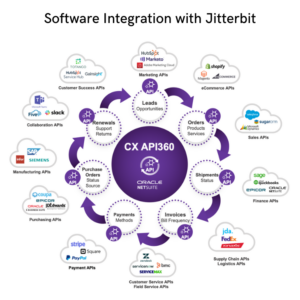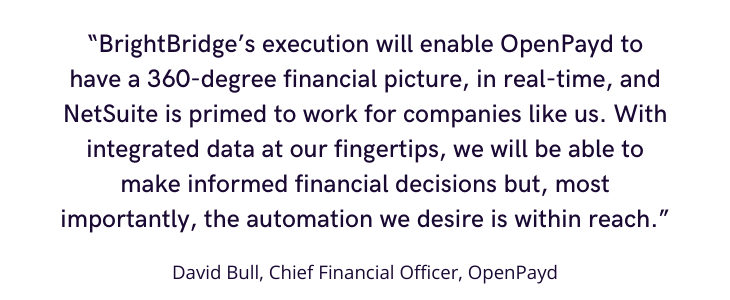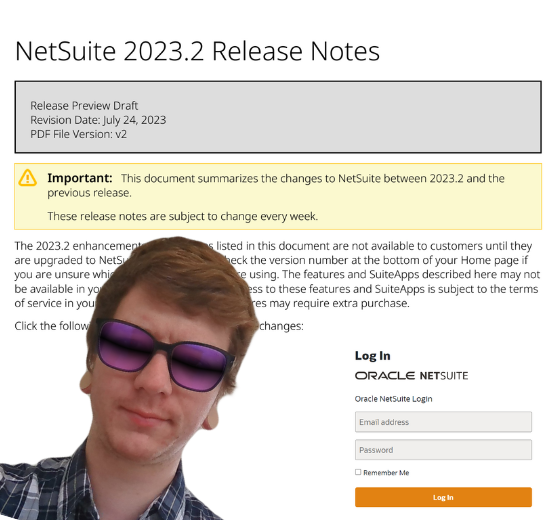FinTech firms aim to integrate technology into offerings by financial services companies in order to improve their use and delivery to consumers. This is based on innovative technology, so implementation of a robust, future-proof business architecture that supports this goal should be a forgone conclusion – but are FinTechs truly realising the benefits and prioritising this action?
With many other business development and growth activities to concentrate on, getting the right business management software in place can be an aspect that is side-lined until the pain points become restrictive. Utilising the right technology will allow the automation of repetitive tasks, leverage Artificial Intelligence (AI) to facilitate informed or even automated decision-making and offer a 360-degree view of business operations that will drive efficiencies within a FinTech business.

Enterprise Resource Planning (ERP) solutions hold the key to achieving automation-driven efficiencies so here we outline what a robust, integrated system looks like in a FinTech business, covering some of the features and functionality of NetSuite. We also highlight how our customer, OpenPayd – a modular platform-based, banking and payments provider – has benefitted from the automation-driven efficiencies available within the award-winning cloud ERP.
Dramatic reductions in labour and error risk with data task automation
Data lies at the heart of every business: it is what businesses base major decisions on and is vital to operations. For a business such as OpenPayd, which deals in multiple currencies across multiple worldwide locations – and has grown to 40 subsidiaries since inception – having one unified system that offers a real-time view of data is crucial.
As the company grew, and made several acquisitions as part of its growth, there were a number of inherited systems for data recording that didn’t connect. This resulted in thousands of lines of data coming in from various locations monthly for reporting purposes. Consolidating this data to provide visibility at a group level was a manual task executed by an outside analyst – and could take in the region of a week or more.
Not only is this labour-intensive task carrying an error risk and causing a delay in reporting, but by the time a report is received it is already out of date. So, decisions based on this week-old data may no longer be the best ones.
As NetSuite provides the capability to use our partner Jitterbit’s API integration platform – which is something OpenPayd’s former ERP solution did not support – the integration of data from multiple systems was something we could easily design and execute for them. Furthermore, NetSuite’s intelligent reporting tools means this data could then be easily viewed, in real-time, by the relevant parties at OpenPayd and used by decision-makers to determine the next best action in a timely manner.

Automation maintains the throne of the king that is cash
Maintaining cash flow in any business in essential and is a fundamental part of business planning and forecasting. Having accounts receivable operatives managing the day-to-day business of generating purchase orders, creating invoices and bank reconciliation is a resource-heavy but necessary business operation.
But with NetSuite, these tasks can be completely automated. The AI mapping capability means invoices or purchase orders can be auto-generated, using system learnings that recognise key elements of regular amounts or payees.
OpenPayd has one account that all payments go into, so matching incoming payments with the right invoices presented a time-consuming task. With the automated bank reconciliation in NetSuite, a payment is automatically matched to an invoice the system recognises as the right one. The relevant operative is also alerted so that it can be checked off as the right payment attributed to the right invoice. Additional rules can also be customised by the user. Over time, this AI becomes more intuitive and automation more refined.
This sophistication is further enhanced as the system starts to learn patterns of customer payment behaviour, creating AI-enabled predictive insights, which are invaluable for planning and budgeting, and forecasting. Having a reliable and sound prediction of when cash could be coming in means the business can plan accordingly. It is this kind of intelligence that can make a real difference to a business needing to cash flow to invest and grow.

Automation highlights anomalies, saving time on manual monitoring and investigation
For a business like OpenPayd dealing in multiple currencies, fluctuations in exchange rates can really affect the bottom line. Historically, the monitoring of payments coming in from foreign countries and being exchanged would be a manual task, to ensure the rate of exchange being given was competitive and representative of average rates. Any anomalies would then be raised by the individual.
Our NetSuite experts allowed OpenPayd to automate this process, setting parameters and reason codes to identify what type of exchange rate variance is occurring, and then flagging which operative needs to investigate the best market rates.
And in a world where crypto currency is fast becoming a commonly traded currency, NetSuite facilitates the holding of crypto as well as the ability to trade with it within the platform, so no revenue lines are restricted.
OpenPayd has been able to leverage the power of NetSuite to best effect, capitalising on the agility of the system as the firm has grown exponentially. We started working with OpenPayd when it required one single company NetSuite user and now the solution comprises 40 subsidiaries. The FinTech could not have managed the many processes involved in disparate systems and siloes without significant resource investment, and understanding that early on in the business lifecycle meant the firm has saved money and time. Having lean, intelligent processes in its arsenal has not only helped manage its growth, but NetSuite has facilitated evolution and expansion.
And while OpenPayd is a great example of how a FinTech firm can best leverage the power of automation within NetSuite to achieve real efficiencies, there are many other features of the solution that can draw on AI and deliver automation.
To find out more about what tasks and processes you could automate in your business, and how we could help your FinTech business achieve true efficiency with NetSuite, get in touch with our expert team.
Keep reading

What is a NetSuite implementation partner? How do you choose one?

Technology fit for total customer service in 2024

Retail and wholesale distribution: how to improve supply chains

Ditching Sage 1000: what you need to know from businesses that have done it

6 ways AI-ready Microsoft Dynamics 365 helps chartered associations serve members

6 retail and wholesale distribution challenges and how NetSuite solves them

The most exciting features in Microsoft Dynamics 365 2023 Release Wave 2

How to manage a new NetSuite Release: one expert's update process

What’s in NetSuite Release 2023.2?

